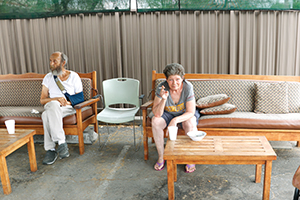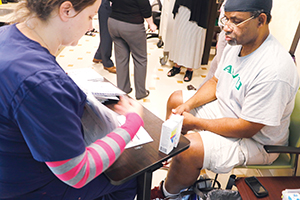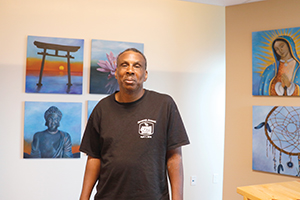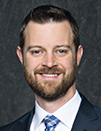By JULIE MINDA
PHOENIX — Average high temperatures park in the triple digits here throughout the summer months. People scurry quickly from air-conditioned cars to air-conditioned buildings.
But, air conditioning is not an option for many of the estimated 25,000-plus homeless people living in Maricopa County, Ariz. For thousands here, finding shade is an ongoing pursuit.

Circle the City respite care residents Richard Zalewski and Cindy Corrales enjoy the center's outdoor gathering area. Circle the City founder Sr. Adele O'Sullivan, CSJ, notes that while some patients arrive using tobacco, as these patients did, Circle the City actively engages them in smoking cessation programs. She said the respite center uses a "harm reduction" philosophy, helping patients improve their health while reversing unhealthy habits.
Looking for shade was what 52-year-old Chris Burditt was doing early this summer when he had a heat stroke. "I woke up in the hospital," he said. Recently released from jail, Burditt had no place to go upon his discharge from Dignity Health St. Joseph's Hospital and Medical Center here. The hospital connected him with Circle the City, a Phoenix respite center, to recover post-discharge and to connect to social services.
"I'm very thankful for them," Burditt said of Circle the City. "It's a good place — they can save lives, get people back into good health."
The Circle the City nonprofit is among a half dozen "communities of care" that St. Joseph's Hospital has been incubating to provide comprehensive services to people in need. Founded in 2008, Circle the City currently includes the 50-bed medical respite center, a family health center several miles away from the respite center, a mobile medical clinic and behavioral health services at each of those venues.
Circle the City provides a continuum of services to help homeless people gain stability. "Expediting an exit from homelessness — that's the goal," said Sr. Adele O'Sullivan, CSJ, a physician and founder of Circle the City, a partner organization of St. Joseph's Hospital.
A phrase imprinted on the wall of the entryway of Circle the City captures the center's purpose: "Everyone deserves a time and place to heal."
Multiple venues
The medical respite center opened in October 2012 with backing from St. Joseph's as well as other philanthropic dollars and in-kind support and federal grant dollars. It provides homeless men and women with a bed and small personal space in gender-segregated living areas. The facility includes a TV room, cafeteria, computer area and outdoor gathering area. The center's staff of about 100 includes physicians, nurse practitioners, physician assistants and other clinicians; behavioral health providers and case managers to connect patients to housing, job help and other social services.

Circle the City licensed practical nurse Brandy Barbee tends to patient Phillip Young in Circle the City's on-site outpatient clinic.
The Parsons Family Health Center outpatient clinic, which opened in September 2015, provides primary care, preventive care, behavioral health services, case management, substance abuse therapy and other services. The federally qualified health center welcomes walk-ins. It follows a medical home model, but staff understand that their transient population of patients may not return regularly or at all, and so they try to address as many patient concerns as possible at every visit.
Circle the City's mobile clinic travels to parks, supportive housing complexes (housing colocated with social services), social service agencies and other locations to provide care and social service support. It's staffed by a physician or a physician assistant, or a nurse practitioner as well as an outreach specialist.
Community of care
Marisue Garganta of Dignity Health St. Joseph's Hospital and Medical Center of Phoenix said St. Joseph's supported Circle the City's establishment and development through the hospital's community of care model.

Chris Burditt recovered from heat stroke at the Circle the City respite center. He is seen here in the center's chapel.
Under this model, St. Joseph's uses its connections to community leaders to unite public and private organizations behind initiatives benefitting the community. In the case of Circle the City, St. Joseph's also has been providing hundreds of thousands of dollars of grant funding as well as administrative support.
Garganta said Circle the City is an essential partner for St. Joseph's, and particularly for two different navigation programs that St. Joseph's and a partner organization run for homeless people. The navigators help homeless people who are accustomed to getting health care from St. Joseph's emergency department into stable housing with effective social support and primary medical care. This way, their nonemergency health and social services needs can be addressed in the proper venue.
The navigators assist with the transition from hospital to Circle the City and/or other housing.
Discharge plan
Sr. O'Sullivan said all of Circle the City's work is geared toward ending the cycle of admission-discharge-regression-admission that is so common among sick people without permanent housing. Brandon Clark, Circle the City's chief executive, said the organization is having an impact in that regard — about 80 percent of the people admitted to Circle the City are discharged to somewhere besides a shelter or the streets.
Fifty-year-old Michael Boyles is among the many patients who healed at Circle the City and then, with the center's help, secured housing. A 15-year resident of Phoenix, Boyles lost his construction job and his apartment last year. While living in a shelter about a year ago, he experienced severe back pain. Tests revealed he had stage four colon cancer and he moved to the respite care facility in October, shortly before he began chemotherapy. Circle the City clinicians and staff have been helping him keep on top of medications and appointments and keeping him active, he said. A Circle the City case manager helped him secure an apartment when he was healthy enough to live away from the center — he moved there in July.

Clark
His primary tumor has shrunk from 33 millimeters to 4 millimeters over the course of his treatment, he said, and he is continuing his treatments while in his apartment.
"If it wasn't for Circle the City, I would have died last year," he said, in gratitude for the respite care service. "I was so sick, I wouldn't have been able to recover."
Circle the City's caring staff has made a lasting impact on him, he said. Sr. O'Sullivan learned last year that while homeless Boyles had lost contact with three grown children and five grandchildren in Colorado Springs, Colo. Sr. O'Sullivan worked with donors to purchase airline tickets for two different trips, so Boyles could visit his family.
"Those trips were really important to me," said Boyles.
|
Shoe box of donations helped inspire Circle the City founder
PHOENIX — As a medical director of a Maricopa County, Ariz., homeless clinic, physician Sr. Adele O'Sullivan, CSJ, knew well the unmet needs of her homeless patients. They ran from shoes and clothes, to glasses and housing.
She reached out to community members and collected their small cash donations in a shoe box that she kept in the storage closet of the homeless clinic, and used for incidental essentials for the patients, according to information from Circle the City, the homeless medical services program she founded.
As donations grew, Sr. O'Sullivan pursued her desire to do more to address practical and social determinants of health for the homeless. She said that as recently as a decade ago in Phoenix, if a person was hospitalized while homeless, "your discharge destination was the streets and the shelters. You'd use 911 as your intervention. But, you would be recycled back to the emergency department because you couldn't get well.
"Where do you go to rest? How do you keep your wounds clean? People on the streets will steal your medications, and so you're at your most vulnerable and afraid to go to sleep," she said.
There is a severe lack of transitional and permanent supportive housing for homeless people in Maricopa County, and social services can be difficult for people to navigate, said Brandon Clark, Circle the City's current chief executive.
Care community
Around the time Sr. O'Sullivan was contemplating an expansion of her ministry, Marisue Garganta of Dignity Health St. Joseph's Hospital and Medical Center of Phoenix was struggling with the flip side of Sr. O'Sullivan's dilemma: What could the hospital do about patients ready for discharge but with no home or support services? Garganta directs community health integration and community benefit for St. Joseph's and heads community grants and investments in Phoenix for Dignity Health.
Beginning around 2008, Garganta, already in regular contact with Sr. O'Sullivan through both women's work with homeless patients, began to marshal Dignity Health and St. Joseph's resources to help Sr. O'Sullivan bring her ideas to fruition.
Garganta said this type of thoughtful collaboration among organizations is a way of extending St. Joseph's mission to help those most in need. "It doesn't serve the hospital well to own all of this work. It's better to collaborate, and for these organizations that we work with to have the halo of St. Joseph's" to extend their capabilities in the community.
— JULIE MINDA
|
Copyright © 2016 by the Catholic Health Association
of the United States
For reprint permission, contact Betty Crosby or call (314) 253-3477.